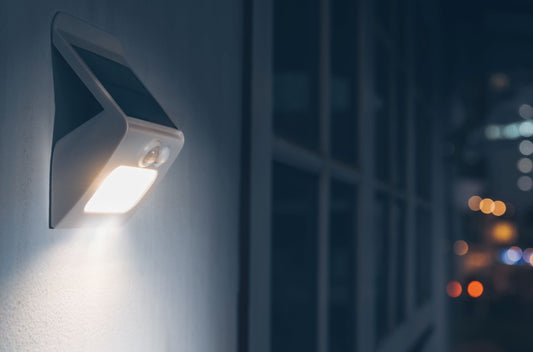
Solar-Powered Wall Lights vs. Traditional Electric Lights: Which is Better?
If you're in the market now for new lighting for your home, you might have come across solar powered wall lights. It might seem like an attractive option since it'll save on your electricity bills. But how exactly are these kind of solar lights different from the traditional electric light option. We'll clear out your questions!
Solar-Powered Wall Lights vs. Traditional Electric Lights
1. Initial vs. Long-Term Savings
Traditional electric lights may seem like the straightforward choice since they’re so familiar. However, they come with some hidden costs. While the initial price might not be too high, the electricity bills can really add up over time. Plus, you have to consider the wiring, which can become quite costly, especially if you need to hire someone to do it.
In contrast, solar-powered wall lights might have a higher upfront cost, but they quickly pay off. Why is that? Once they’re set up, they run on solar energy, meaning your energy bills won’t increase. The best part? You won’t need to worry about wiring or drilling into your walls. Just position them in a spot that gets plenty of sunlight, and you’re all set.
2. Energy Efficiency
Let’s be honest—cutting down on your electricity bill isn’t just about saving money; it’s also about being more environmentally friendly. Conventional electric lights consume power from the grid, which in many areas still depends largely on fossil fuels. Each time you turn on that light, you’re contributing to your carbon footprint.
In contrast, solar-powered lights utilize the sun’s energy—completely renewable and entirely free. If you’re aiming for a more sustainable lifestyle, solar is clearly the way to go. Plus, you won’t have to worry about leaving your lights on all night; they recharge automatically during the day, ensuring you’re using energy wisely.
3. Installation
If you prefer to avoid complicated installations, solar lights are a great option.
Since they are entirely wireless, you can set them up in just a few minutes—no electrician required. Simply attach them to a wall, fence, or even a tree, and let the sun take care of the rest.
In contrast, traditional electric lights involve more work. You'll have to drill holes, run wires, and possibly navigate electrical permits. If DIY isn't your strong suit, you may need to hire someone, leading to additional costs and inconvenience.
4. Reliability
You might be wondering: can solar lights really provide the same level of brightness as electric lights? Sure, but there's a minor catch. olar lights depend on sunlight for charging, so their brightness can decrease on cloudy or rainy days. Fortunately, many modern solar lights are equipped with robust batteries that store energy, allowing them to maintain their brightness even after a few overcast days.
On the other hand, electric lights don’t face this issue since they are always plugged into a power source. If you live in a region that doesn’t receive much sunlight, traditional electric lights may be a more reliable choice for consistent brightness.
5. Maintenance
Both types of lights need some maintenance, but solar-powered lights are usually easier to care for. With solar lights, you might just need to clean the solar panel now and then to ensure it works well. That’s all—no bulb changes or concerns about wiring.
In contrast, electric lights often require more regular upkeep, particularly if they’re outside. Weather conditions like rain and snow, along with general wear and tear, can impact the wiring, resulting in outages that may need fixing.
WHICH ONE TO GO FOR?
If you're seeking an affordable and environmentally friendly option that’s simple to install, solar-powered wall lights are an excellent choice. They can help you save on energy costs while also minimizing your carbon footprint.
On the other hand, if you live in a place with limited sunlight or if you prefer a more conventional lighting solution that provides steady brightness, electric lights may be more suitable for your needs.